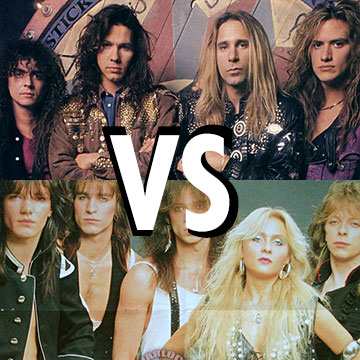first round game
(3) aerosmith, "rag doll"
vs
(14) bulletboys, "smooth up in ya"
Read the essays, watch the videos, listen to the songs, feel free to argue below in the comments or tweet at us, and consider. Winner is the aggregate of the poll below and the @marchshredness twitter poll. Polls close @ 9am Arizona time on 3/6.
AMORAK HUEY ON AEROSMITH'S "RAG DOLL"
Summer 1988. I had just graduated from high school. Everything seemed possible. I quit my job as a veterinary assistant, lived off the money I’d saved or gotten for graduation, and spent that summer hanging out with friends, having the shallowest imaginable conversations about the meaning of life and thinking we were deep.
We were dorky kids, mostly-nice kids, boring kids, play-it-safe kids, smart-enough kids who made good grades and basically followed the rules, kids who assumed our best days were in front of us; I didn’t drink until college, didn’t do drugs, had barely ever had a girlfriend. About the most illicit thing we did that summer was find a backdoor at the high school gym that no one locked, so we’d go in late at night and play basketball. My friends worked at video stores and miniature golf courses, a frozen yogurt place and a Turtle’s Records and Tapes: the most 1988 jobs possible. Whoever got off work the latest, the rest of us would wait for them in the parking lot at their job, hanging out on the hoods of our cars until we got hungry, at which point we’d go to Denny’s and drink sweet tea and order off the breakfast menu. Rebels without a cause if ever there were.
No surprise, then, that part of that summer’s soundtrack was Permanent Vacation. Living in a movie, indeed.
Let’s get the obvious out of the way: Aerosmith never was really a hair band.
Sure, they had the trappings of a hair band. They would have passed for a hair band to a disinterested observer, like your parents or your pastor. Their music fell into the broad category of “if you listen to this you’re going to hell.” It’s hard to articulate meaningful differences between Aerosmith and, say, Skid Row or Cinderella: four or five guys with hair spray and leather pants and drum solos and whatnot. But I’m telling you, something was different. Aerosmith was not—is not—the same as the other bands in this bracket. (If anyone can hair-split like an 18-year-old quibbling about the rules of a particular subculture, it’s a middle-aged dude explaining the nuances of whatever makes him nostalgic. Lucky for you, I’m both.)
When I told my friends from high school—their hair mostly gone or at least gone gray—about this tournament of hair bands and told them which song I’d be writing about, they shrugged. What is there to say about Aerosmith?
How about this: Aerosmith was the rock band that cheerleaders and popular kids listened to. At the other end of the spectrum, for the kids in the back rows of your homeroom, the scary kids, you had your Judas Priests and Iron Maidens. In the middle, for those of us who neither good-looking or confident or athletic enough to be popular nor menacing enough to be sneaking cigarettes in the bathrooms, that was where hair metal found its demographic. Kids looking for an identity. Looking for an edge.
Aerosmith is the erasure of edge. Aerosmith is middle America. A band right down the center of Main Street, the Wonder Bread of heavy metal, mainstream to the core.
I’m making most of this up. It sounds good. It sounds right. It’s comforting to assert things about music, things about 1988, about who I was then and what that suggests about who I am now. That’s why I write essays and poems. It’s why I listened to metal music: for the clarity it offered about the world, even in its wrongheadedness.
What defines Aerosmith perhaps more than anything is the way they evolved, from gigantically successful 1970s arena rockers to rehab to a career resuscitated by, of all things, a collaboration with Run-DMC to faux hair metal to 1990s power pop. Chameleon band, shapeshifting into whatever sold. Steven Tyler wound up as a judge on American Idol, which is the least surprising outcome ever.
It might be strange to say in 2018, when songs appear in television ads before they ever hit the radio, or Spondora or Patify, however you whippersnappers get your music, but it used to be considered, like, highly gauche for a rock band to allow its work to be used for commercial purposes. (Does anyone else remember it being kind of a scandal when a bastardized version of “Twist and Shout” appeared in an ad for milkshakes?) For a musical act, to let slip any hint of fiscal intent was to risk being called a sellout. There was no higher insult.
So most bands pretended they didn’t care about money. Not so with Aerosmith. That band would slap a decal on every inch of its very soul if there was a buck in it. There was an Aerosmith video game, a shooter called Revolution X, in which players tried to rescue the band from the clutches of some oppressive overlord by shooting CDs at the bad guys. (It was every bit as dumb as it sounds; I’ll cop to having wasted a few dollars on it at an arcade in Tallahassee in 1994 or so.) There was—still is, apparently—an Aerosmith-themed roller coaster at Walt Disney World. Aerosmith was so totally committed to selling out that you kind of had to respect them for it.
Other bands in this tourney of Shredness tried to survive the death of hair metal. Skid Row went for a rockabilly outlaw country thing. Cinderella turned sort of bluesy. Axl Rose stubbornly stuck with the same thing he’d always done. None of it worked. (Saddest thing in the world? A bleary, weary Lita Ford on Behind the Music defiantly predicting her genre would rise again.)
Meanwhile, there was Aerosmith, plugging along, making music hardly that anyone would say they loved but most everyone would probably say they kind of liked, or, you know, weren’t bothered by. Most importantly, Aerosmith was making music that people would pay for. The band had a song in the top 40 as recently as 2012, which seems impossible. That’s 37 years after “Sweet Emotion,” their first hit. How many rock bands have had such staying power, have hit the charts consistently over such a span of time? The Moody Blues, Rolling Stones, Rush, ZZ Top … that’s about it. Aerosmith is in rare air.
This fluidity and stamina offer perhaps the most damning argument against Aerosmith’s inclusion in this tournament. One of the defining characteristics of hair metal (according to me) is its refusal to evolve. Its stasis. It’s part of the reason the genre came and went within a decade: it was defiantly, stubbornly, proudly of its moment. The Peter Pan of musical genres, the Lost Boys refusing to grow up: We are going to sing about sex and drugs in the most juvenile way imaginable, and we are going to do it as loud as we can forever.
And that right there? That is why “Rag Doll” belongs in this tournament, even if Aerosmith doesn’t. Hell, it should win.
“Rag Doll” is what you would get if you boiled down every other song in the bracket to its essence and then made a new song out of that.
That’s basically how it was made, too.
Aerosmith was coming off a pretty serious flop (can anyone name a single song from Done with Mirrors?) that was supposed to be their comeback album, their first with Geffen. But it was a bust. So the label brought in “song doctor” hitmakers like Desmond Child, Jim Vallance, and Holly Knight, all of whom had credentials making songs for acts such as Bon Jovi, Pat Benatar, KISS, and Joan Jett. Although the members of Aerosmith now speak fondly of the collaboration, much of what I read while working on this essay suggests they initially bristled at the notion, then accepted it grudgingly when Geffen gave them no choice, and made Permanent Vacation. Then they cashed the checks—and kept cashing them.
At the time, most of the band members were crawling out of rehab, newly cleaned up. This put them a bit out of sync with the rest of the hair metal bands, which were just then diving headfirst into the most debauched excesses of rock and roll. The members of Aerosmith were clearly the grownups in the room, having partied hard and emerged on the other side, ready to make some money. Steven Tyler is closer in age to Mick Jagger than to Vince Neil or Axl Rose.
“Rag Doll” is a cartoon of a hair metal song, which is already a genre of cartoon songs. The lyrics are a blend of borderline nonsense, problematic sexual allusions, and catchy rhymes. The video is the same way. It follows the genre’s classic mode of cutting back and forth between concert footage and the vague suggestion of a story, in this case about a young woman who is, I guess, escaping from her overprotective, undershirt-wearing father so she can seduce Tyler (who at the time was closing in on 40, probably at least as old as the actor playing the dad).
The video’s “plot” is vague to the point of incomprehensible. Something something she has a disturbingly lecherous dad. Something something she has a lollipop. Something something she takes off most of her clothes. Something something she’s making out with Steven Tyler now. You know, the traditional narrative arc.
Summer 1988. The most liminal season of my life. The months between high school and college. I was certain huge changes were on the horizon. Like, the good stuff would begin anytime now. The Reagan era was ending; I thought maybe Al Gore was going to be the next president. The 1990s were fast approaching, and that definitely sounded like the future. It was a summer where I achieved nothing, basically did nothing; thirty years later, my mother still talks about how useless I was at home, around the house only long enough to sleep and dirty a few dishes before heading back out to some parking lot to wait for something, anything meaningful to occur. There’s a reason I think of the events of that summer in first person plural; I did not exist as an individual. I was only my friends, only waiting, only hungering. It’s hard to imagine more appropriate song to commemorate those few months than one from an album called Permanent Vacation, a song full of fragments and false starts and half-baked ideas about sex.
The lyrics make no sense, tell no story. It’s a song you can sing along with, but probably not every line. It’s the same sounds over and over: daaaa-da, da-da da-da da-da, daaaa-da, da-da da-da da-da. Every syllable stressed. Or unstressed. It’s hard to tell. It doesn’t matter.
“A new version of the old scene.”
“Get it while it’s easy.”
“Give it all you got until you’re out out of your misery.”
“Yes I’m movin’ / Yes I’m movin’ / Get ready for the big time.”
We were ready for the big time, all right. We were moving. The world was ripe and full of promise. We were living in a movie. We were the protagonists.
Everything about the song is a metaphor for what it was like to be a stupid cis heterosexual 18-year-old middle-class white boy in 1988. We thought we knew so much; we knew nothing. We thought the world would belong to us someday; we had no idea how little we deserved it. The song ends with Steven Tyler scatting as the music fades away. The video ends with Tyler bidding farewell to the nightgown-clad woman he’s been making out with and driving away, piloting a red Shelby Cobra slowly down a suburban street. As he passes each house on the block, a young woman runs out and waves at him or blows him a kiss. If asked at the time, we would have told you we identified with Tyler in that scene. But it’s clear now, looking back, that trapped by our age, our expectations, our hungers, our bodies, our identities, our ignorance, we were instead the ones running out of those houses, waving, optimistic, naïve, eager to be taken along. We had no idea how to get from here to there, or where we might be going, but it was pretty clear Tyler knew the way. We would have followed him anywhere.
Amorak Huey, a 2017 NEA Fellow, is author of the poetry collections Ha Ha Ha Thump (Sundress, 2015) and Boom Box (Sundress, forthcoming 2019), as well as two chapbooks. He is co-author with fellow Shredness essayist W. Todd Kaneko of the textbook Poetry: A Writer’s Guide and Anthology (Bloomsbury, 2018) and teaches at Grand Valley State University in Michigan.
KATIE MOULTON on bulletboys' "smooth up in ya"
Powerful. Aggressive. Sleazy. Putrid yet pleasant.
That’s how original bassist Lonnie Vencent described BulletBoys’ music in 1989, when the band was riding highest, at the crest of its popularity. “Putrid yet pleasant” sums up “Smooth Up In Ya”: Marq Torien’s snakey spandex, the thrumming bassline, the fat kick-and-snare, the guitar solo that lasts one very long minute yet never seems to resolve. The chorus lyric is a-sensical, yet the riff stays with you like a crusty stain. “Putrid yet pleasant” is the epitome of Shredness, which succeeds when it teases new heights of moronic, phallo-centric farce. “Smooth Up In Ya” is the platonic ideal of anti-intellectual, anti-human cock rock. It’s cock-a-doodle-douchebaggery! What more is there to think about?
Yet I did think harder. Listen deeper. And what I found up in “Smooth Up In Ya”—with its excess of style and dearth of critical thought and shirts—was a more expansive, even feminist, performance of desire and sexual negotiation.
“Smooth Up In Ya” squealed and thumped onto the airwaves in 1988. Back then, my family lived in a Missouri development of split-level homes, all middle-class linoleum and fake wood-grain. The backyards were tessellated chainlink. All the other moms on the block looked like they were auditioning for an off-brand Whitesnake video. A few of them looked like they would have been cast—rolling across the hood of a car or leaping off their front porch like “Daddy’s little cutie” to chase Steven Tyler down the street (barf). They dyed and teased and sprayed their hair. Their eyelashes were thick with mascara, their lipstick red and immoveable. They wore tied-up tank tops and acid-wash cut-offs. They looked nothing like my mom. I rejected them outright. I was a scared and therefore judgmental kid. These other moms swatted my fellow kids in public, but also ignored them totally, letting them run around screaming into the night and giving them sips off their Busch Light cans when they were thirsty. The other moms were all named Karen.
But they were hot. They could be ditzy and sharp, kind and loud, but never as loud as the men. Still, at countless driveway parties, they made known their preferred sex symbols: Dwight Yoakam in painted-on leather pants, Billy Ray Cyrus minus sleeves, and the wild-maned men of hair metal. So I tried to listen to “Smooth Up In Ya” as the other moms would have.
While “Smooth Up In Ya” appears to be another utterly crass hair-metal come-on, the song breaks the mold in its concern for the partner’s pleasure. Marq Torien addresses a woman under the assumption that she’s playing hard-to-get, but who may simply be uninterested in his serpentine preening. He flicks his hair and promises to “send shivers/ smooth up in ya (smooth up in ya) in ya.” The syntax is critical: It’s not Torien’s hypothetical cock that will be dispatched “smooth up in ya”; instead, it is “shivers” of pleasure! Whose pleasure? Not Torien’s, and not Mick Sweda’s, wanking off the guitar in the corner. It’s the subject’s pleasure! "Don’t let your lovin’ go to waste," he sings, "All it takes is just one taste"—which we must assume is his offer to apply his mouth to wherever his partner wishes. And just how are shivers sent, not down but up? The associative leap echoes Rilke: And we, who always think of happiness as a rising, would feel the emotion that almost overwhelms us— Because poetic association is required to describe the complex magic of the orgasm not only of the female, but of any person other than oneself! That shit requires an attuned empathy, brosef.
The other element that sets “Smooth Up In Ya” apart: While most of these frizzy peacocks must insist on their conquests, bang you over the head with claims that she totally wants it, there’s no confirmation that this lust is requited. There are two ways I like to imagine the song’s scenario playing out: First, the potential partner does not accept Torien’s invitation, and the extended guitar solo, its diddling and wailing, is a sonic metaphor for the speaker tending to his desire in the privacy of his tour-bus shower.
The second scenario I imagine is that the agent of desire decides to give the speaker and his shivers a chance, and the guitar solo is describing the length and intricacy of the oral sex he is performing. And maybe the partner is enjoying themself, and maybe their desires, like those of the moms on my block, are a little sleazy, putrid even—but pleasant.
Okay, I admit this is mostly bullshit. Dear reader, I listened to BulletBoys so you don’t have to. I researched this certified-platinum garbage. I know things I can’t un-know. For example, “Smooth Up In Ya” may be the least problematic original track the band recorded. Consider "Kissin' Kitty" and its admiration for "a pretty with a titty kissin' every dude in sight." (Dude just can't resist that internal rhyme!) Or "Hard As a Rock," which includes the very special lyrics "Give me the g-string shivers/ She's always in heat." In a 1988 live video of that song, even Marq Torien looks a little desperate in his kneepads and crop-top, belly rolling through every chorus as it develops its thesis (read this slowly): "Hard as a rock/ Hard as a rock/ You get me baby, hard as a rock/ Hard as a rock/ Hard as a rock…" Et cetera.
I know Marq Torien still tours as BulletBoys and has cycled through more than 30 band members. The band (with the exception of Torien’s voice) sounds just awful live, no matter its incarnation. I know Torien was an early Trump supporter and attempted to sell a pair of his own pants—worn—online for $7,000. Perhaps this was to raise funds for the child support he didn’t pay, and for which Torien was arrested in 2015—shirtless, naturally. No one even knows whether it’s The Bulletboys or just Bulletboys or BulletBoys. “Smooth Up In Ya” has zero annotations in Genius because it’s just that vapid. Mostly putrid.
No, this is probably not art worth examining. No, this analysis is not what (the) BulletBoys intended. But this is about fantasy as empowerment, as control. And hey, fuck Bulletboys!
One night, our old block woke to squealing tires. One of the Karens and her husband Wally ran an unruly household at the bottom of the hill, and that night it burst out onto the street. There was shouting, slamming doors, honking, and a peel-out. Whatever Wally did, Karen wasn’t taking it. Maybe he pleaded, maybe he negged her, bluffed and blustered, maybe he tried to stop her going. Maybe he just didn’t get her off. The peel-out seemed to last forever, but really it lasted the length of an extended guitar solo: the time it took Karen to screech out of her driveway and burn rubber all the way up the block—dragging Wally behind her, flailing from the tailgate of her pickup.
I don’t know what happened to most of the other moms. There were divorces and deaths and babies having babies; there were happily-ever-afters, whatever that means. But I want to believe that these women were loved, but not only loved. I want to believe that they were sexually fulfilled. That they were listened to. That they got their shivers on their own terms.
Katie Moulton is a writer and music critic from St. Louis. She is currently the Hub City Writer-in-Residence working on a book called Dad Rock, and you can find more of her work here.






